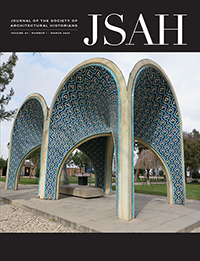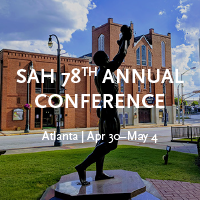The Society of Architectural Historians supports the
ACLS Statement on SCOTUS Ruling on Affirmative Action (copied below).
ACLS Statement on SCOTUS Ruling on Affirmative Action
Last week, the Supreme Court of the United States (SCOTUS) ruled race-conscious admissions programs at colleges and universities to be unlawful, thus rejecting widely accepted practices meant to encourage diversity that have been part of US higher education for more than fifty years.
The American Council of Learned Societies stands firm in our belief in the value of diversity at all levels of higher education. The active participation of diverse people in the scholarly enterprise is the best way to combat historic and systemic inequities. It is the best way to ensure that scholars represent the world’s rich diversity of communities and cultures. It is the best way—the proven way—to address past erasures in scholarship. Diverse scholarly perspectives advance our collective efforts as a society to understand our past and present and to make informed decisions about our future.
As an organization whose membership includes a Research University Consortium of 44 of our country’s most highly selective institutions of higher education, we want to call attention to the impact of this decision on the production and circulation of knowledge in colleges and universities. If undergraduate communities are less diverse, graduate schools and the future professoriate will also be less diverse. As the range of future scholars and teachers narrows, so will our scholarly perspective, and students—and all of us who benefit from learning—will suffer.
ACLS remains committed to continuing to support and celebrate scholars, administrators, scholarship, and institutions that contribute to a more just and equitable academy now and for generations to come.
Our commitment includes fellowship and grant programs strategically designed to support diversity and equity in the academy. This includes programs targeted to historically under-funded institutions such as Historically Black Colleges and Universities, as well as fellowships for scholars who have traditionally had less access to external research support and scholarly resources, including first-generation scholars and those from marginalized communities. We will continue our work in making these opportunities accessible to scholars working across the expanding landscape of humanistic fields of study in and beyond the academy.
In partnership with academic societies, scholars, administrators, supporters, and peer organizations, we seek better ways to recruit and retain a diverse community of scholars across all fields of study and to serve a more diverse professoriate. We will continue our collective effort to ignite and advance systemic change within the academy. We look forward to collaborating with all these groups in exploring additional methods to sustain diversity related to socioeconomic class as well as race and gender.
We believe this work is essential to fulfilling our mission to support the creation and circulation of knowledge for the public good. We encourage all our member institutions to join us.


